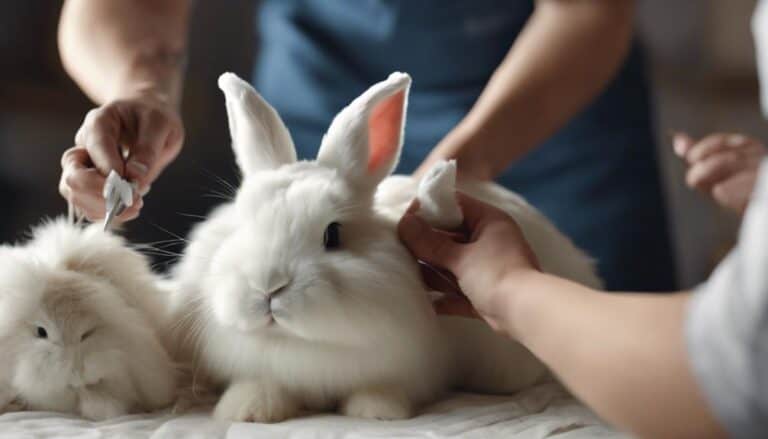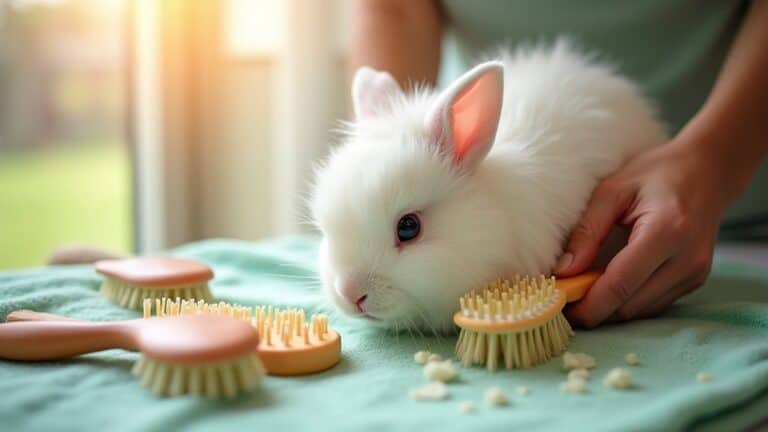You might think your bunny is healthy and thriving without regular check-ups, but have you considered the hidden risks that could be lurking beneath the surface?
Bunny check-ups go beyond a simple glance; they investigate deep into your furry friend's well-being, uncovering potential health concerns that may not be apparent to the untrained eye.
Stay tuned to discover the essential reasons why these check-ups are indispensable for your bunny's health and happiness.
Contents
- 1 Key Takeaways
- 2 Importance of Regular Bunny Check-Ups
- 3 Signs of Healthy Bunny Check-Ups
- 4 Preventive Care Measures for Bunnies
- 5 Common Health Issues in Bunnies
- 6 Cost Considerations for Bunny Check-Ups
- 7 Finding the Right Bunny Veterinarian
- 8 What Are the Benefits of Regular Check-Ups for Bunny Health?
- 9 Frequently Asked Questions
- 10 Conclusion
Key Takeaways
- Bunny check-ups are essential for early detection of issues and ensuring a long, healthy life.
- Regular monitoring of weight, teeth, eyes, and behavior is crucial for bunny health.
- Preventive care measures like proper diet and exercise can prevent common health issues in bunnies.
- Quality veterinary care for bunnies leads to healthier, happier rabbits and prevents serious health issues.
Importance of Regular Bunny Check-Ups
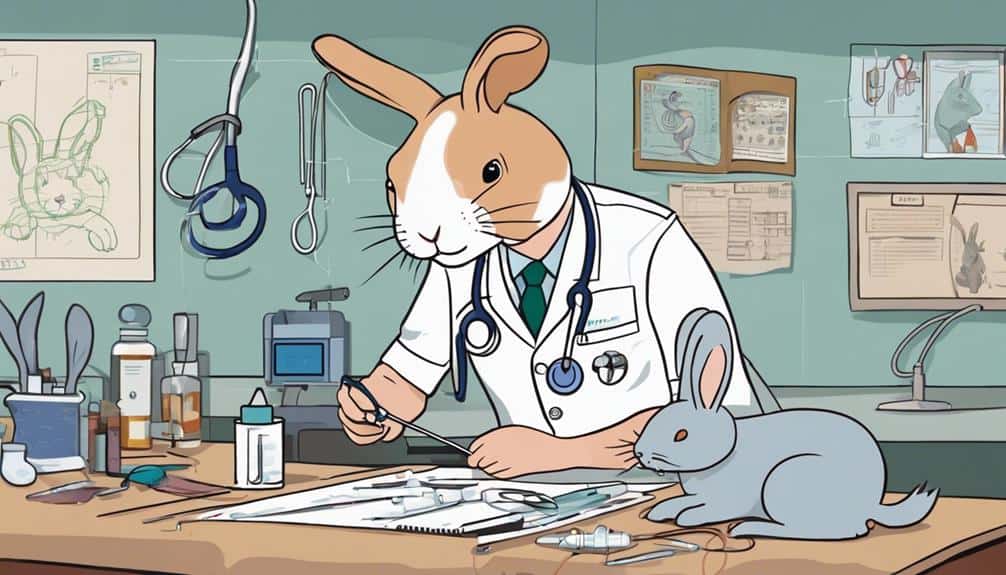
Regular bunny check-ups play an essential role in maintaining the overall health and well-being of your furry companion, allowing for early detection of any potential issues. These routine visits to the vet are vital for ensuring your rabbit's health remains at its best.
During these check-ups, the vet will examine various aspects of your rabbit's well-being, including teeth, weight, breathing, heart rates, ears, and eyes. By establishing a baseline health status through regular check-ups, any changes or abnormalities can be more easily tracked and addressed promptly.
In addition to the physical examination, blood tests conducted during these check-ups can reveal underlying conditions that may not be externally visible. This proactive approach to your rabbit's health can help prevent more serious health issues from developing or progressing unnoticed.
Regardless of your rabbit's age, routine vet visits are essential for maintaining their health and happiness. Regular check-ups contribute significantly to ensuring your rabbit leads a long, healthy life.
Signs of Healthy Bunny Check-Ups
During bunny check-ups, monitoring various indicators such as weight, teeth, eyes, ears, and fur cleanliness is important for evaluating your rabbit's health status.
When checking your rabbit's health, observe for any changes in behavior, eating habits, or energy levels, as these can be signs of underlying health issues. Additionally, it's vital to check their breathing to make sure it's regular and not labored, which could indicate respiratory problems.
Make sure to monitor your bunny's droppings and urine consistency, as normal excretions are indicators of a healthy rabbit. Proper examination of your bunny's leg, feet, and nail alignment is also essential during check-ups to prevent any musculoskeletal issues.
Preventive Care Measures for Bunnies
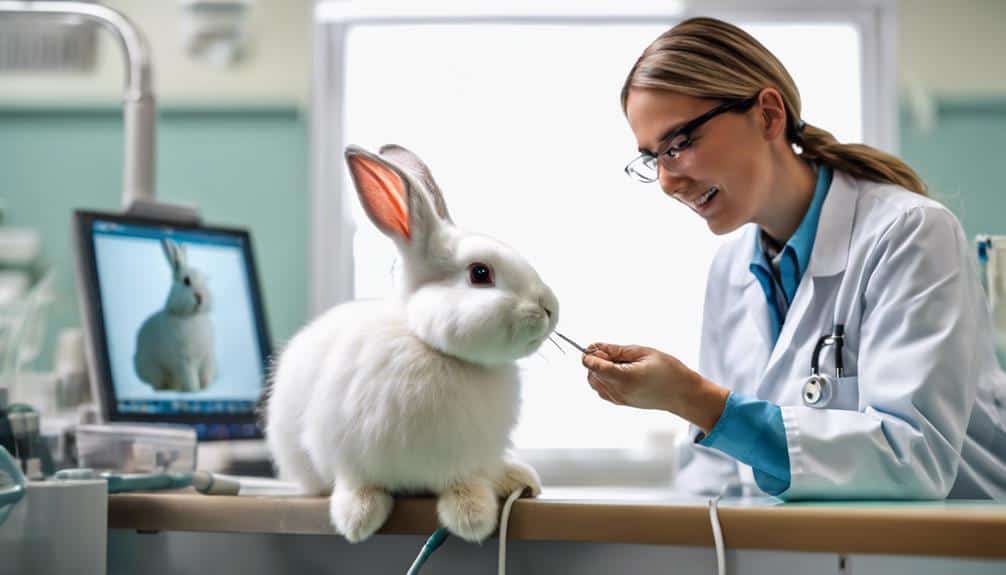
When it comes to preventive care measures for your bunnies, focusing on their diet and nutrition, as well as ensuring they get enough exercise and enrichment, are essential aspects to contemplate.
By monitoring what your bunnies eat and providing them with a balanced diet, you can help prevent potential health issues.
Incorporating exercise and enrichment activities into their routine promotes physical and mental well-being, contributing to their overall health and happiness.
Diet and Nutrition
To maintain excellent health for your bunny, ensuring a diet high in fiber, such as hay, is essential to support gut health and prevent gastrointestinal issues. Here are some key dietary tips for keeping your bunny healthy and happy:
- Fiber-rich Diet: Provide unlimited access to grass hay like timothy or oat hay to aid digestion.
- Fresh Vegetables: Offer a variety of fresh vegetables daily to guarantee a balanced diet.
- Limit Pellets: Pellets should be a small portion of your bunny's diet to prevent obesity.
- Avoid Sugary Treats: Say no to sugary treats and high-carb foods to maintain dental health and weight control.
Following these guidelines and monitoring your bunny's food intake will help maintain their well-being and prevent potential health issues.
Exercise and Enrichment
Maintaining your bunny's health and well-being involves ensuring they've ample opportunity for exercise and enrichment activities to prevent health issues and promote mental stimulation.
Exercise is essential for your bunny, as it allows them to run, jump, and explore, preventing obesity and promoting overall well-being. Enrichment activities such as tunnels, toys, and puzzle feeders can prevent boredom and behavioral issues. Encouraging natural behaviors like foraging and digging keeps bunnies active and engaged.
Regular exercise and enrichment reduce the risk of obesity, musculoskeletal problems, and dental issues. Providing access to safe outdoor spaces or supervised indoor playtime allows bunnies to exercise and explore safely. Remember, a healthy bunny is a happy bunny!
Common Health Issues in Bunnies
Common health issues in bunnies like dental problems and parasites are manageable with proper care. Regular check-ups and preventive measures can help you identify these issues early.
Maintaining good hygiene and seeking veterinary advice are essential steps in keeping your bunny healthy.
Bunny Dental Care
Ensuring proper dental care for your bunny is essential to prevent painful issues such as overgrown teeth, abscesses, and difficulty eating. Here are some key points to contemplate when it comes to bunny dental care:
- Regular Dental Check-ups: Schedule routine appointments with a rabbit-savvy vet to monitor your bunny's dental health.
- Signs of Dental Issues: Watch out for drooling, reduced appetite, weight loss, and changes in behavior, as these could indicate dental problems.
- Common Dental Problems: Be aware of issues like malocclusion, elongated roots, and sharp points on teeth that can affect your bunny's well-being.
- Proper Teeth Trimming: Ensure your vet trims your rabbit's teeth as needed to prevent complications and maintain overall health.
Parasite Prevention
Regular veterinary check-ups are essential for detecting and treating parasites that can impact your bunny's health. Parasites such as fleas, mites, and intestinal worms pose a threat to your rabbit's well-being. Through routine vet check-ups, these parasites can be identified early on, preventing potential health complications.
Keep an eye out for symptoms like itching, hair loss, and digestive issues, as they may indicate a parasite infestation. To reduce the risk of parasites, implement preventative measures like regular grooming and cleaning of your bunny's living areas. Consulting a veterinary professional will help you establish an effective parasite prevention and treatment plan tailored to your bunny's specific needs.
Stay proactive in safeguarding your bunny's health by prioritizing parasite prevention.
Cost Considerations for Bunny Check-Ups
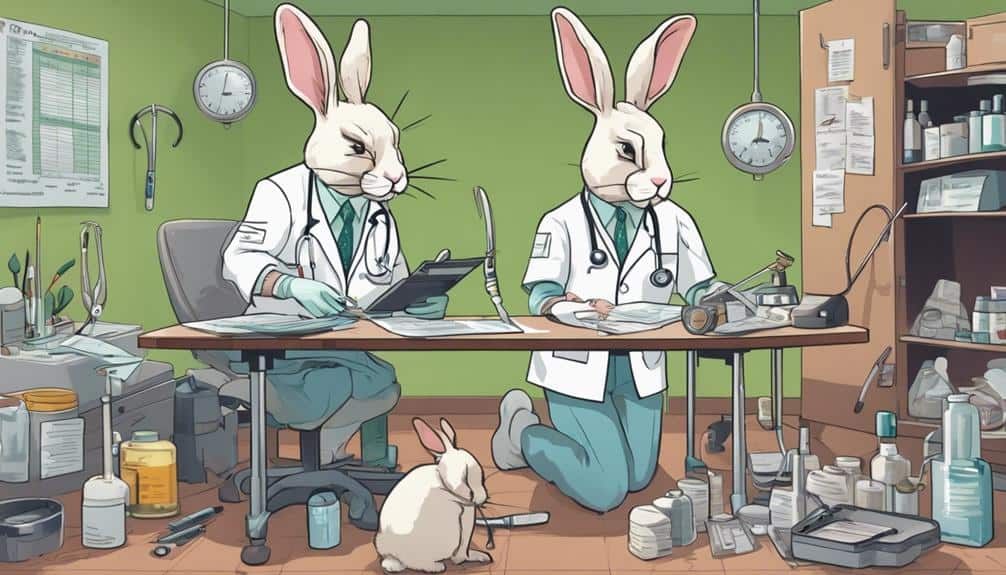
Considering the varying veterinary care costs for bunny check-ups, it's essential to reach out to local exotic animal vets to inquire about pricing and make sure you find a rabbit-savvy vet in your area.
Here are some key points to keep in mind regarding the cost considerations for bunny check-ups:
- Vet Visit Cost: Veterinary care costs for bunnies can differ based on location and the specific services provided, so it's wise to compare prices from different exotic animal vets in your area.
- Research Exotic Animal Vets: Look for vets who specialize in treating exotic animals like rabbits to make sure your bunny receives the best care possible.
- Regular Bunny Check-Ups: Investing in regular check-ups can help prevent potential health issues and may be more cost-effective in the long run compared to treating illnesses that could have been caught early.
- Establishing a Relationship: Building a relationship with a vet before emergencies arise can help you better manage the cost of bunny check-ups and make sure your rabbit's ongoing health and well-being.
Finding the Right Bunny Veterinarian
To find the right veterinarian for your bunny, seek out specialized small animal veterinarians or those with expertise in treating small mammals or exotic animals. These professionals are well-equipped to provide the specialized care that rabbits need. The House Rabbit Society offers listings of vet clinics that cater to rabbits, making it easier to find a suitable veterinarian. Additionally, conducting a Google search for exotic animal vets in your area can help in locating a vet with experience in rabbit care.
When selecting a vet for your rabbit, it's important to make sure that they've prior experience and credentials in treating rabbits. Checking the credentials and reviews of a veterinarian before scheduling an appointment can help guarantee quality care for your bunny. By choosing a vet who specializes in small animals or exotic species, you can make sure that your rabbit receives the best possible care to maintain its health and well-being.
What Are the Benefits of Regular Check-Ups for Bunny Health?
Regular vet checkups for bunnies are essential for their overall health and wellbeing. These checkups help detect any potential health issues early on, which ultimately leads to better treatment outcomes. Additionally, they allow the vet to provide important preventive care to ensure that your bunny stays happy and healthy.
Frequently Asked Questions
Do Bunnies Need Vet Checkups?
Yes, bunnies need routine vet check-ups for preventative care, health monitoring, and early detection of issues. Regular exams establish a baseline and make sure your bunny's well-being. Don't skip these crucial appointments to keep your fluffy friend healthy.
Is It Worth Taking a Rabbit to the Vet?
Taking your rabbit to the vet is worth it. Routine check-ups assure their health and well-being. Home remedies and alternative care can complement professional advice. Natural treatments may help, but vet visits are essential for thorough care.
How Often Should You Health Check a Rabbit?
For best health, give your rabbit a vet check-up once or twice yearly, increasing to at least biannual visits after age five. Regular check-ups are crucial as bunnies conceal illness well, warranting early detection and treatment.
Should I Take My Rabbit to the Vets?
Yes, taking your rabbit to the vet is essential for their well-being. Regular check-ups guarantee early detection of health issues, leading to better outcomes. Avoid relying solely on home remedies or DIY care; professional veterinary care is vital for your rabbit's health.
Conclusion
To sum up, regular bunny check-ups are like a compass guiding you on the path to your rabbit's health and happiness. Just as a map helps you navigate unfamiliar territories, vet visits help you navigate your bunny's well-being.
So, don't hesitate to schedule those check-ups and guarantee your furry friend's long and joyful journey ahead. Trust in the guidance of your veterinarian to steer you in the right direction for your bunny's health.



